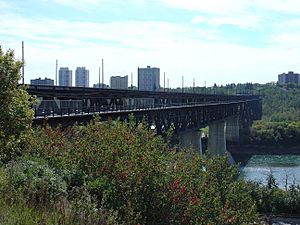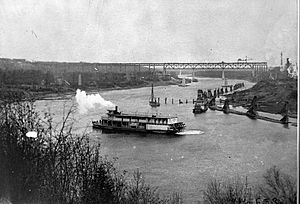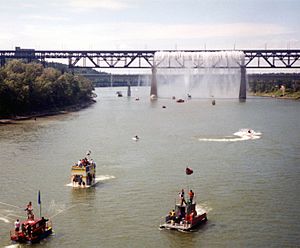High Level Bridge (Edmonton) facts for kids
Quick facts for kids High Level Bridge |
|
|---|---|

Edmonton's High Level Bridge from north bank, above LRT portal, September 2006
|
|
| Coordinates | 53°31′50″N 113°30′38.4″W / 53.53056°N 113.510667°W |
| Carries | 109 Street, High Level Bridge Streetcar |
| Crosses | North Saskatchewan River |
| Locale | Edmonton, Alberta, Canada |
| Maintained by | the City of Edmonton |
| Heritage status | Municipal Historic Resource |
| Characteristics | |
| Design | Phillips B. Motley, CPR |
| Material | Steel trusses on concrete piers |
| Total length | 777 m (2,549 ft) |
| Width | 2 vehicular lanes, one-way |
| Longest span | 88 m (289 ft) |
| Number of spans | 28 |
| Piers in water | 4 |
| Clearance below | 48 m (157 ft) |
| History | |
| Constructed by | John B. Gunn and Sons |
| Opened | June 2, 1913 |
| Lua error in Module:Location_map at line 420: attempt to index field 'wikibase' (a nil value). | |
The High Level Bridge is a famous bridge in Edmonton, Alberta, Canada. It crosses the North Saskatchewan River. This bridge is special because it helped connect two separate communities, Edmonton and Strathcona, which later became one big city in 1912. When it was built, it was designed to carry trains, streetcars, cars, and even people walking!
The first train crossed the bridge on June 2, 1913. Streetcar service began on August 11, 1913. Car traffic started a bit later, once the lower deck was finished. This lower deck needed special metal to stop cinders from steam trains falling onto cars below.
In 1994, the bridge became owned by the City of Edmonton. The next year, it was named a Municipal Historic Resource. This means it's an important historical landmark. Trucks are not allowed on the bridge because it's too low and the lanes are too narrow.
Today, car traffic on the bridge only goes one way, heading south. The upper part of the bridge now has just one track. This track is used by the High Level Bridge Streetcar. This is a historic streetcar that takes people on a fun ride from Old Strathcona to downtown Edmonton.
Contents
Bridge Changes Over Time
Traffic Flow Adjustments
In 1980, the way traffic moved on the High Level Bridge changed. It became one-way southbound for cars. This was part of a plan to use it better with the nearby Walterdale Bridge. For a while, electric trolley buses also used the bridge. Special wires were added to help these buses cross. These wires were removed in 2009 when trolley bus service stopped.
Repairs and Upgrades
The bridge had big repairs and upgrades between 1994 and 1995. The old paint was carefully taken off. Over 100,000 litres of new paint were used to protect the bridge's metal parts.
Future Use and Condition
In 2018, a study looked at whether a new LRT line could use the bridge. The study found that the bridge, even though it was built for heavy trains, couldn't handle the extra weight of a new LRT line. This is because some parts of the bridge have rusted over time.
When the city took over the bridge, some main parts had lost almost half their width due to rust. Repainting and maintenance have slowed this down a lot. Even though it can't carry more weight, the bridge is still safe for its current uses.
Lighting Up the Bridge
In 2013, a project called "Light the Bridge" started. The goal was to cover the bridge with LED lights. These lights would make the bridge glow for special events. The project raised about $2.5 million.
The lights were turned on for the first time on July 1, 2014. The lighting was even set to the music of "O Canada." The lights can show many different colours. They are often programmed to match local events, like showing green and gold for the Edmonton Eskimos games.
The Great Divide Waterfall
In 1980, a special man-made waterfall was added to the bridge. It was called the Great Divide Waterfall. This waterfall dropped 64 metres into the North Saskatchewan River. That's even higher than Niagara Falls! It used 50,000 litres per minute of water.
The waterfall ran on summer holiday weekends until 2009. It was then turned off. City council discussed bringing it back for a while. They even set aside money for repairs. However, the cost to fix it was too high, about $2.6 million.
In 2016, the city decided not to remove the waterfall's pipes. This means that even though it's not working now, it could possibly be turned on again in the future. The waterfall is still considered a part of the City of Edmonton's public art collection.



